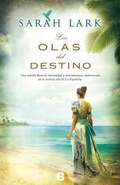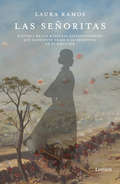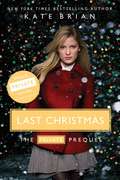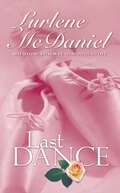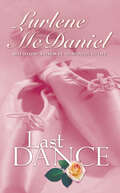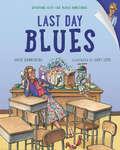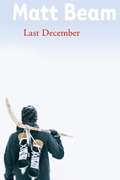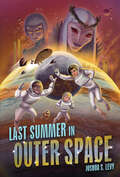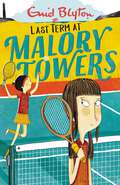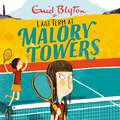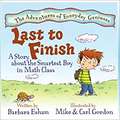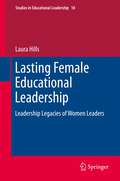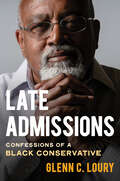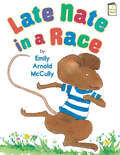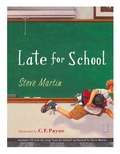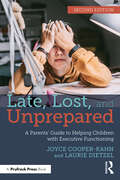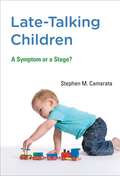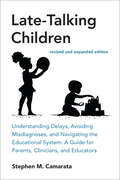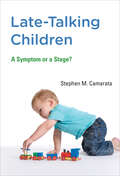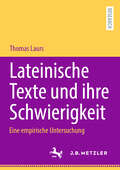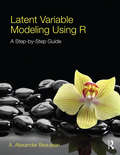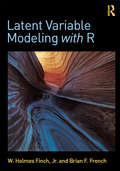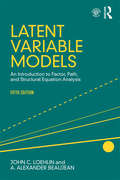- Table View
- List View
Las olas del destino: Serie Jamaica V. II
by Susana Andrés Font Sarah LarkIsla de Jamaica, 1753. Deirdre, la hija de la inglesa Nora Fortnam y del esclavo Akwasi, lleva una vida protegida en la plantación de su madre y de su padre adoptivo. Pese a los orígenes poco claros de la joven, los muchachos de la isla beben los vientos por ella. Deirdre, sin embargo, no siente el menor interés por ninguno de ellos hasta que el joven médico Victor Dufresne pide su mano. Tras una espléndida ceremonia nupcial, la pareja de recién casados zarpa hacia Saint-Domingue, en La Española. Los sucesos que allí acontecerán transformarán sus vidas por completo… «Como era la primera vez que navegaba, Deirdre observó llena de emoción que el barco zarpaba y se dirigía a alta mar mientras la orilla de Jamaica se iba haciendo más diminuta hasta desaparecer en el horizonte. Victor la había rodeado con el brazo para consolarla, pero para Deirdre era más fuerte el ansia de aventura que la pena por la despedida. Pasó el día en cubierta y celebró la presencia de los delfines que acompañaban la embarcación. -Delante de La Española también verás ballenas -anunció Victor-. Van para celebrar la boda. Por fortuna son pacíficas. En caso contrario habría que tenerles miedo, son casi tan grandes como nuestro barco. -¡Qué bonito que todos celebren las bodas! -exclamó Deirdre riendo-. Ay, Victor, desde que estoy contigo tengo la impresión de que toda mi vida es una gran fiesta.»
Las señoritas: Historia de las maestras estadounidenses que Sarmiento trajo a la Argentina en el siglo XIX
by Laura RamosLa historia más bella y mejor documentada de las sesenta y una jóvenes maestras que Sarmiento "importó" de los Estados Unidos a la Argentina en el siglo XIX. Sus amores, tragedias y relaciones prohibidas, y sus batallas pedagógicas y aventuras en las luchas políticas que asolaban la república, en un relato cautivante de la mano de Laura Ramos. En la concreción de su febril sueño civilizador, Sarmiento no escatimó recursos pero tampoco tropelías. Su cruzada en favor de universalizar la lectoescritura en la Argentina se materializó en una sucesión de iniciativas signadas por un fuerte sentido de lo épico y una inocultable admiración por los Estados Unidos de América. Entre ellas, ninguna resulta tan cautivante como la "importación" de sesenta y una jóvenes maestras de ese país al nuestro. Si en la batalla de la educación se jugaba la guerra por la construcción de una nación, las señoritas llegadas entre 1869 y 1898 configuraron un capítulo fundamental de esa lucha que contemporáneamente era fácil dar por perdida de antemano. En este libro único por su rigor historiográfico y su delicadeza narrativa, Laura Ramos urde los hilos de sus biografías y borda la filigrana íntima y doméstica de su historia hecha de amores, tragedias, relaciones prohibidas, batallas pedagógicas y aventuras, recortada sobre el fondo de los antagonismos políticos que asolaban la república que dejaba atrás su pasado colonial.
Last Christmas: The Private Prequel (Private)
by Kate BrianAriana Osgood has everything an Easton Academy girl could want: straight A's, the perfect boyfriend, and a coveted spot in exclusive Billings House. But on the first night of Christmas vacation, a blizzard traps her on campus with irresistible bad-boy Thomas Pearson. Alone. Instead of snuggling with her boyfriend next to a cozy fire in Vermont, she's huddling for warmth with Thomas in Ketlar House. As the snow transforms Easton into a winter wonderland, Ariana finds herself falling for Thomas. But someone is watching their clandestine romance unfold, someone intent on turning their holiday weekend into a nightmare... Last Christmas reveals the secret of what really happened before Private began -- and the shocking truth will change everything for fans of Kate Brian's bestselling series.
Last Dance (Lurlene McDaniel Books)
by Lurlene N. McDanielRachel Deering has her eyes on her toes: she wants to become a world-class ballerina. As a 14-year-old, she is already one of the best dancers in the country. Just as she prepares for an audition for an opening with a prestigious dance troupe, Rachel starts having some very disturbing symptoms. After collapsing at school, she has many tests and her doctor tells her the news: She has diabetes. Now her world consists of blood tests, insulin shots, a controlled diet, and constant fear that she will have a reaction and end up unable to dance—or worse.
Last Dance (Lurlene Mcdaniel Books Ser.)
by Lurlene N McDanielRachel Deering has her eyes on her toes: she wants to become a world-class ballerina. As a 14-year-old, she is already one of the best dancers in the country. Just as she prepares for an audition for an opening with a prestigious dance troupe, Rachel starts having some very disturbing symptoms. After collapsing at school, she has many tests and her doctor tells her the news: She has diabetes. Now her world consists of blood tests, insulin shots, a controlled diet, and constant fear that she will have a reaction and end up unable to dance—or worse.
Last Day Blues (The Jitters Series #2)
by Julie DannebergFans of First Day Jitters will love spending the last day of school in Mrs. Hartwell classroom. What do teachers do for summer vacation? Mrs. Hartwell's students worry that their teacher will miss them while they are gone for the summer. The class comes up with a way to make sure Mrs. Hartwell won't be too sad. But Mrs. Hartwell and the other teachers have some plans of their own.Once again Julie Danneberg and Judy Love bring to life the crazy antics of Mrs. Hartwell and her class and show that teachers and students are more alike than we sometimes think.
Last December
by Matt BeamWritten in the form of a suicide note from a teenaged boy to his unborn sister, this tells the story of how a ninth-grader comes to accept his less than ideal life after witnessing the struggles of a friend with serious depression.
Last Summer in Outer Space (Adventures of the PSS 118 #3)
by Joshua S. LevyJack's eighth-grade year aboard the PSS 118 is coming to an end. And the students and faculty of the best public schoolship in the galaxy (if it does say so itself) are on the verge of completing their mission. If all goes well, they'll soon foil the sinister alien plot that's put all of humanity in danger. But this is still middle school. So all does not go well. When the original plan backfires, it's up to Jack, Ari, and Becka to take on the evil Minister one more time and make the galaxy safer for everyone.
Last Term: Book 6
by Enid BlytonWelcome to Malory Towers, where there's more to life than lessons!Darrell Rivers is Head Girl of Malory Towers and there is plenty to keep her busy. Spoilt Gwendoline is up to her usual tricks and Amanda is prepared to risk everything to be chosen to swim in the Olympics. Can Darrell stop Gwendoline from ruining their final term before it's time to wave goodbye?Now a fantastic TV drama on CBBC and BBC iPlayer.Between 1946 and 1951, Enid Blyton wrote six novels set at Malory Towers. Book 6 was first published in 1951. This edition features the classic text and is unillustrated.*Malory Towers ®, Enid Blyton ® and Enid Blyton's signature are registered trade marks of Hodder & Stoughton Limited. No trade mark or copyrighted material may be reproduced without the express written permission of the trade mark and copyright owner.
Last Term: Book 6 (Malory Towers #6)
by Enid BlytonWelcome to Malory Towers, where there's more to life than lessons!Darrell Rivers is Head Girl of Malory Towers and there is plenty to keep her busy.Spoilt Gwendoline is up to her usual tricks and Amanda is prepared to risk everything to be chosen to swim in the Olympics. Can Darrell stop Gwendoline from ruining their final term before it's time to wave goodbye?Between 1946 and 1951, Enid Blyton wrote six novels set at Malory Towers. Book 6 was first published in 1951. This recording is based on the classic text.*(P) 2019 Hodder & Stoughton LimitedMalory Towers ®, Enid Blyton ® and Enid Blyton's signature are registered trade marks of Hodder & Stoughton Limited. No trade mark or copyrighted material may be reproduced without the express written permission of the trade mark and copyright owner.
Last Term: Book 6 (Malory Towers #6)
by Enid BlytonWelcome to Malory Towers, where there's more to life than lessons!Darrell Rivers is Head Girl of Malory Towers and there is plenty to keep her busy. Spoilt Gwendoline is up to her usual tricks and Amanda is prepared to risk everything to be chosen to swim in the Olympics. Can Darrell stop Gwendoline from ruining their final term before it's time to wave goodbye?Now a fantastic TV drama on CBBC and BBC iPlayer.Between 1946 and 1951, Enid Blyton wrote six novels set at Malory Towers. Book 6 was first published in 1951. This edition features the classic text and is unillustrated.*Malory Towers ®, Enid Blyton ® and Enid Blyton's signature are registered trade marks of Hodder & Stoughton Limited. No trade mark or copyrighted material may be reproduced without the express written permission of the trade mark and copyright owner.
Last Term: Book 6 (Malory Towers #6)
by Enid BlytonWelcome to Malory Towers, where there's more to life than lessons!Darrell Rivers is Head Girl of Malory Towers and there is plenty to keep her busy. Spoilt Gwendoline is up to her usual tricks and Amanda is prepared to risk everything to be chosen to swim in the Olympics. Can Darrell stop Gwendoline from ruining their final term before it's time to wave goodbye?Now a fantastic TV drama on CBBC and BBC iPlayer.Between 1946 and 1951, Enid Blyton wrote six novels set at Malory Towers. Book 6 was first published in 1951. This edition features the classic text and is unillustrated.*Malory Towers ®, Enid Blyton ® and Enid Blyton's signature are registered trade marks of Hodder & Stoughton Limited. No trade mark or copyrighted material may be reproduced without the express written permission of the trade mark and copyright owner.
Last to Finish: A Story About the Smartest Boy in Math Class (The Adventures of Everyday Geniuses #2)
by Mike Gordon Barbara Esham<p>The second picture book in The Adventures of Everyday Geniuses series features Max, a third-grader who had always liked math until his teacher started using a timer for testing the class on multiplication facts. Max clutches when he tries to hurry. When his missing math folder reveals that Max has been working problems from the older brother s algebra book for fun, he is invited to join the school math team as well as a program for accelerated math students. <p>Tinted with colorful washes, ink drawings illustrate the story with sympathy and humor. One particularly expressive picture illustrates the phrase my mind freezes with a drawing of unhappy Max seated at his school desk, his head turned into a snowman s noggin, carrot nose and all. The well-phrased text also reassures children that understanding is more important than memorization and that a strength in one area of learning can offset a weakness in another.</p>
Lasting Female Educational Leadership
by Laura HillsOur colleges and universities are being led in large part by baby boomers who are now in later midlife. Huge numbers of those middle-aged leaders will retire within the next 10 years. While we know that being in later midlife and impending retirement must influence a person in a leadership position at an institution of higher learning, we don't really understand how. This book is based upon an empirical study that linked higher education leadership to one aspect of midlife known as generativity. This psychosocial phenomenon was described by Erik Erikson as a desire that peaks in midlife to leave something for future generations before one dies. Generativity typically manifests itself in the legacy one intends to leave. The author of this book has completed a multiple case study of women who are in later midlife and who hold high-level leadership positions at an institution of higher learning. In this work, she shares more than has ever been known about the nature, antecedents, and support of generativity in the leadership of female higher education leaders in midlife.
Late Admissions: Confessions of a Black Conservative
by Glenn LouryA shockingly frank memoir from a prize-winning economist, reflecting on his remarkable personal odyssey and his changing positions on identity, race, and belief. Economist Glenn C. Loury is one of the most prominent public intellectuals of our time: he’s often radically opposed to the political mainstream, and delights in upending what’s expected of a Black public figure. But more so than the arguments themselves—on affirmative action, institutional racism, Trumpism—his public life has been characterized by fearlessness and a willingness to recalibrate strongly held and forcefully argued beliefs. Loury grew up on the south side of Chicago, earned a PhD in MIT’s economics program, and became the first Black tenured professor of economics at Harvard at the age of thirty-three. He has been, at turns, a young father, a drug addict, an adulterer, a psychiatric patient, a born-again Christian, a lapsed born-again Christian, a Black Reaganite who has swung from the right to the left and back again. In Late Admissions, Loury examines what it means to chart a sense of self over the course of a tempestuous, but well-considered, life.
Late Nate in a Race (I Like to Read)
by Emily Arnold McCullyOn the day of the race, Nate is running late. Find out what happens when he tries out going fast in this Guided Reading Level D story. Nate likes to go slow. His brother and sister are worried they'll miss the race—but mom tells them not to nag him. When they get there, Mom convinces Nate to try, too. . . . And Nate finds out sometimes he likes to go slow, but sometimes he likes to go fast! With colorful, kid-friendly illustrations by Caldecott Honor artist Emily Arnold McCully, this simple story about the rewards of trying new things is perfect for emergent readers. The award-winning I Like to Read® series focuses on guided reading levels A through G, based upon Fountas and Pinnell standards. Acclaimed author-illustrators--including winners of Caldecott, Theodor Seuss Geisel, and Coretta Scott King honors—create original, high quality illustrations that support comprehension of simple text and are fun for kids to read with parents, teachers, or on their own! Suitable for late kindergarten readers, Level D books feature wider vocabulary, longer sentences, and greater variety in sentence structure than levels A, B, and C. When Level D is mastered, follow up with Level E.
Late for School
by Steve Martin C. F. PayneGetting to school has never been quite this difficult--or hilarious. Celebrated writer and performer Steve Martin and dynamic artist C. F. Payne (illustrator of John Lithgow's children's books) have teamed up to tell a story of the adventure, danger, and laughs of the journey to school. Undoubtedly a new classic for readers of all ages,
Late, Lost, and Unprepared: A Parents’ Guide to Helping Children with Executive Functioning
by Joyce Cooper-Kahn Laurie DietzelDoes your child have difficulty meeting deadlines, staying organized, or keeping track of important information? Do they tend to forget details? Are they prone to emotional meltdowns? This book will become your go-to, all-inclusive guide to helping children manage issues with these executive functions, a set of related yet distinct mental skills that allow us to stay on target as we work toward our goals.Packed with encouragement, strategies, overviews, case studies, tips, and more, this newly revised edition offers science-based information explained in accessible, everyday language. You will find down to earth examples and a flexible framework that allows you to think on your feet and adapt the strategies to any child or situation.In addition to providing approaches for helping your child to manage demands in the short run, this book offers strategies for building independent skills for long-term self-management. Covering what you need to know, as well as what you can do, Late, Lost, and Unprepared gives parents the support they need to help their child become productive and independent – today and in the future.
Late-Talking Children
by Stephen M. CamarataWhen children are late in hitting developmental milestones, parents worry. And no delay causes more parental anxiety than late talking, which is associated in many parents' minds with such serious conditions as autism and severe intellectual disability. In fact, as children's speech expert Stephen Camarata points out in this enlightening book, children are late in beginning to talk for a wide variety of reasons. For some children, late talking may be a symptom of other, more serious, problems; for many others, however, it may simply be a stage with no long-term complications. Camarata describes in accessible language what science knows about the characteristics and causes of late talking. He explains that today's greater awareness of autism, as well as the expanded definition of autism as a "spectrum" of symptoms, has increased the chances that a late-talking child will be diagnosed -- or misdiagnosed -- with autism. But, he reminds us, late talking is only one of a constellation of autism symptoms. Although all autistic children are late talkers, not all late-talking children are autistic. Camarata draws on more than twenty-five years of professional experience diagnosing and treating late talkers -- and on his personal experience of being a late talker himself and having a late-talking son. Camarata offers parents valuable guidance on seeking treatment, advising them to get second and third opinions if necessary, and warning them against false diagnoses, unqualified practitioners, and ineffective therapies. He provides information that will help parents navigate the maze of doctors, speech therapists, early childhood services, and special education; and he describes the effect that late talking may have on children's post-talking learning styles.
Late-Talking Children, revised and expanded edition: Understanding Delays, Avoiding Misdiagnoses, and Navigating the Educational System: A Guide for Parents, Clinicians, and Educators
by Stephen M. CamarataA revised and expanded edition of the bestselling guide to late-talking children for parents, clinicians, and educators, from a leading authority on development and disabilities.Every year in America, more than half a million parents of late-talking children face agonizing questions: What should I do if my two- or even three-year-old has not yet begun to talk? Should I worry that my child is autistic or intellectually disabled? Are expensive therapies or medications needed? Will my child ever speak normally? In this revised and expanded edition of the essential resource on the subject, Late-Talking Children, Stephen Camarata—the parent of a late-talking child and a late talker himself—provides clear, sensible, and compassionate answers for parents, clinicians, and educators, drawing on his more than three decades of experience diagnosing and treating the &“late-talking syndrome&” as well as the best science available today.
Late-Talking Children: A Symptom or a Stage? (The\mit Press Ser.)
by Stephen M. CamarataWhat parents need to know about the causes and treatment of children's late talking: how to avoid misdiagnoses, navigate the educational system, and more.When children are late in hitting developmental milestones, parents worry. And no delay causes more parental anxiety than late talking, which is associated in many parents' minds with such serious conditions as autism and severe intellectual disability. In fact, as children's speech expert Stephen Camarata points out in this enlightening book, children are late in beginning to talk for a wide variety of reasons. For some children, late talking may be a symptom of other, more serious, problems; for many others, however, it may simply be a stage with no long-term complications.Camarata describes in accessible language what science knows about the characteristics and causes of late talking. He explains that late talking is only one of a constellation of autism symptoms. Although all autistic children are late talkers, not all late-talking children are autistic. Camarata draws on more than twenty-five years of professional experience diagnosing and treating late talkers—and on his personal experience of being a late talker himself and having a late-talking son. He provides information that will help parents navigate the maze of doctors, speech therapists, early childhood services, and special education; and he describes the effect that late talking may have on children's post-talking learning styles.
Lateinische Texte und ihre Schwierigkeit: Eine empirische Untersuchung
by Thomas LaursIn diesem Buch wird ein neuartiger Ansatz zur Vorhersage der Schwierigkeit lateinischer Texte entwickelt, der die sprachliche Analyse mit Methoden des maschinellen Lernens verbindet. Grundlage der Untersuchung sind lateinische Texte unterschiedlicher Schwierigkeitsstufen, deren Lesbarkeit von Studenten subjektiv eingeschätzt worden ist und durch eine Vielzahl sprachlicher Variablen quantitativ erfasst wird. Ein zentrales Ziel der Arbeit ist es, ein Modell zu erstellen, das auf Basis der sprachlichen Variablen und der Einschätzungen der Probanden die Schwierigkeit eines lateinischen Textes bewerten kann. Hierzu wurden sowohl klassische linguistische Methoden als auch moderne NLP-Tools eingesetzt. Untersucht werden sprachliche Parameter aus den Bereichen Lexik und Semantik, Morphologie, Syntax und Diskurslinguistik. Ein besonderes Augenmerk liegt auch auf der Unterscheidung zwischen prosaischen und poetischen Texten. Die Ergebnisse tragen nicht nur zur Schwierigkeitsbestimmung lateinischer Texte bei, sondern eröffnen auch neue Perspektiven für die Didaktik des Lateinischen. Sie zeigen, wie digitale Methoden die Bewertung und Auswahl von Lehrmaterialien erleichtern können und leisten zugleich einen Beitrag zur Verbindung von klassischer Philologie und moderner Datenwissenschaft.
Latent Variable Modeling Using R: A Step-by-Step Guide
by A. Alexander BeaujeanThis step-by-step guide is written for R and latent variable model (LVM) novices. Utilizing a path model approach and focusing on the lavaan package, this book is designed to help readers quickly understand LVMs and their analysis in R. The author reviews the reasoning behind the syntax selected and provides examples that demonstrate how to analyze data for a variety of LVMs.? Featuring examples applicable to psychology, education, business, and other social and health sciences, minimal text is devoted to theoretical underpinnings. The material is presented without?the use of matrix algebra. As a whole the book prepares readers to write about and interpret LVM results they obtain in R. Each chapter features background information, boldfaced key? terms defined in the glossary, detailed interpretations of R output, descriptions of how to write the analysis of results for publication, a summary, R based practice exercises (with solutions included in the back of the book), and references and related readings. Margin notes help readers better understand LVMs and write their own R syntax. Examples using data from published work across a variety of disciplines demonstrate how to use R syntax for analyzing and interpreting results. R functions, syntax, and the corresponding results appear in gray boxes to help readers quickly locate this material. A unique index helps readers quickly locate R?functions, packages, and datasets. The book and accompanying website at http://blogs.baylor.edu/rlatentvariable/ provides all of the data for the book’s examples and exercises as well as R syntax so readers can replicate the analyses. The book reviews how to enter the data into R, specify the LVMs, and obtain and interpret the estimated parameter values. The book opens with the fundamentals of using R including how to download the program, use functions, and enter and manipulate data. Chapters 2 and 3 introduce and then extend path models to include latent variables. Chapter 4 shows readers how to analyze a latent variable model with data from more than one group, while Chapter 5 shows how to analyze a latent variable model with data from more than one time period. Chapter 6 demonstrates the analysis of dichotomous variables, while Chapter 7 demonstrates how to analyze LVMs with missing data. Chapter 8 focuses on sample size determination using Monte Carlo methods, which can be used with a wide range of statistical models and account for missing data. The final chapter examines hierarchical LVMs, demonstrating both higher-order and bi-factor approaches. The book concludes with three Appendices: a review of common measures of model fit including their formulae and interpretation; syntax for other R latent variable models packages; and solutions for each chapter’s exercises. Intended as a supplementary text for graduate and/or advanced undergraduate courses on latent variable modeling, factor analysis, structural equation modeling, item response theory, measurement, or multivariate statistics taught in psychology, education, human development, business, economics, and social and health sciences, this book also appeals to researchers in these fields. Prerequisites include familiarity with basic statistical concepts, but knowledge of R is not assumed.
Latent Variable Modeling with R
by W. Holmes Finch Brian F. FrenchThis book demonstrates how to conduct latent variable modeling (LVM) in R by highlighting the features of each model, their specialized uses, examples, sample code and output, and an interpretation of the results. Each chapter features a detailed example including the analysis of the data using R, the relevant theory, the assumptions underlying the model, and other statistical details to help readers better understand the models and interpret the results. Every R command necessary for conducting the analyses is described along with the resulting output which provides readers with a template to follow when they apply the methods to their own data. The basic information pertinent to each model, the newest developments in these areas, and the relevant R code to use them are reviewed. Each chapter also features an introduction, summary, and suggested readings. A glossary of the text’s boldfaced key terms and key R commands serve as helpful resources. The book is accompanied by a website with exercises, an answer key, and the in-text example data sets. Latent Variable Modeling with R: -Provides some examples that use messy data providing a more realistic situation readers will encounter with their own data. -Reviews a wide range of LVMs including factor analysis, structural equation modeling, item response theory, and mixture models and advanced topics such as fitting nonlinear structural equation models, nonparametric item response theory models, and mixture regression models. -Demonstrates how data simulation can help researchers better understand statistical methods and assist in selecting the necessary sample size prior to collecting data. -www.routledge.com/9780415832458 provides exercises that apply the models along with annotated R output answer keys and the data that corresponds to the in-text examples so readers can replicate the results and check their work. The book opens with basic instructions in how to use R to read data, download functions, and conduct basic analyses. From there, each chapter is dedicated to a different latent variable model including exploratory and confirmatory factor analysis (CFA), structural equation modeling (SEM), multiple groups CFA/SEM, least squares estimation, growth curve models, mixture models, item response theory (both dichotomous and polytomous items), differential item functioning (DIF), and correspondance analysis. ?The book concludes with a discussion of how data simulation can be used to better understand the workings of a statistical method and assist researchers in deciding on the necessary sample size prior to collecting data.? A mixture of independently developed R code along with available libraries for simulating latent models in R are provided so readers can use these simulations to analyze data using the methods introduced in the previous chapters. Intended for use in graduate or advanced undergraduate courses in latent variable modeling, factor analysis, structural equation modeling, item response theory, measurement, or multivariate statistics taught in psychology, education, human development, and social and health sciences, researchers in these fields also appreciate this book’s practical approach. The book provides sufficient conceptual background information to serve as a standalone text.? Familiarity with basic statistical concepts is assumed but basic knowledge of R is not.
Latent Variable Models: An Introduction to Factor, Path, and Structural Equation Analysis, Fifth Edition
by A. Alexander Beaujean John C. LoehlinLatent Variable Models: An Introduction to Factor, Path, and Structural Equation Analysis introduces latent variable models by utilizing path diagrams to explain the relationships in the models. This approach helps less mathematically-inclined readers to grasp the underlying relations among path analysis, factor analysis, and structural equation modeling, and to set up and carry out such analyses. This revised and expanded fifth edition again contains key chapters on path analysis, structural equation models, and exploratory factor analysis. In addition, it contains new material on composite reliability, models with categorical data, the minimum average partial procedure, bi-factor models, and communicating about latent variable models. The informal writing style and the numerous illustrative examples make the book accessible to readers of varying backgrounds. Notes at the end of each chapter expand the discussion and provide additional technical detail and references. Moreover, most chapters contain an extended example in which the authors work through one of the chapter’s examples in detail to aid readers in conducting similar analyses with their own data. The book and accompanying website provide all of the data for the book’s examples as well as syntax from latent variable programs so readers can replicate the analyses. The book can be used with any of a variety of computer programs, but special attention is paid to LISREL and R. An important resource for advanced students and researchers in numerous disciplines in the behavioral sciences, education, business, and health sciences, Latent Variable Models is a practical and readable reference for those seeking to understand or conduct an analysis using latent variables.
